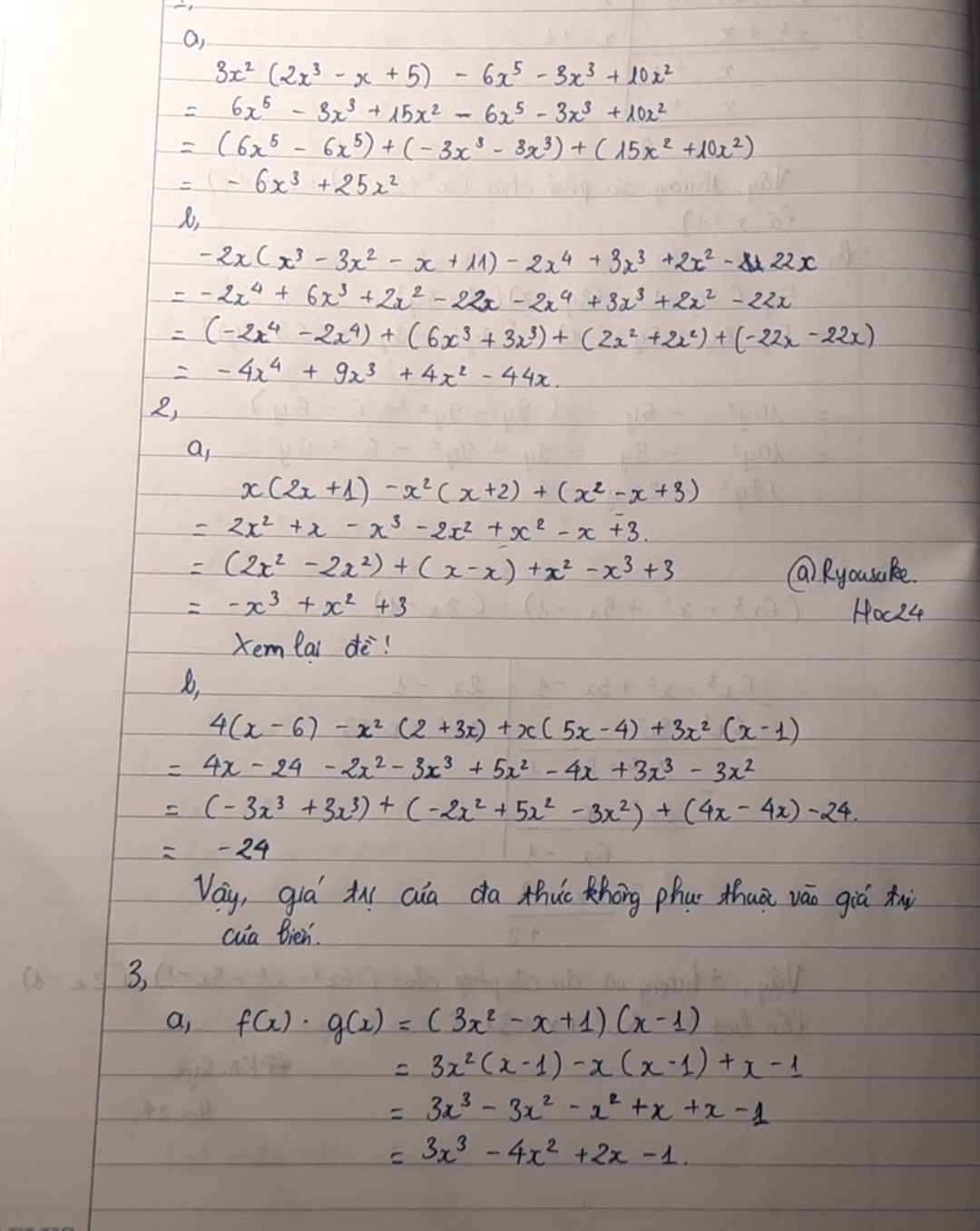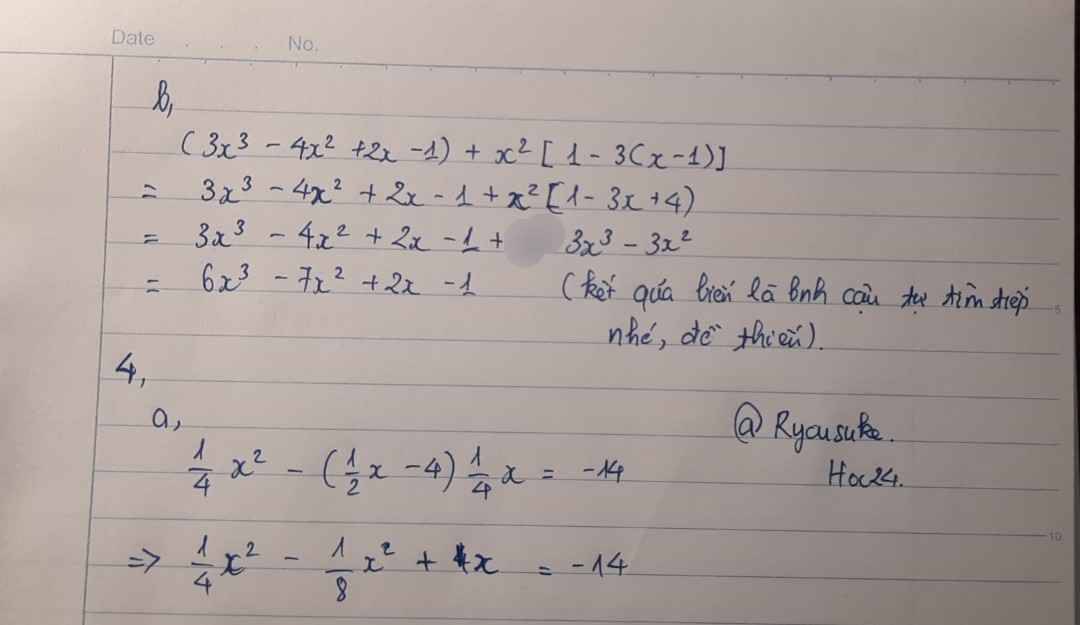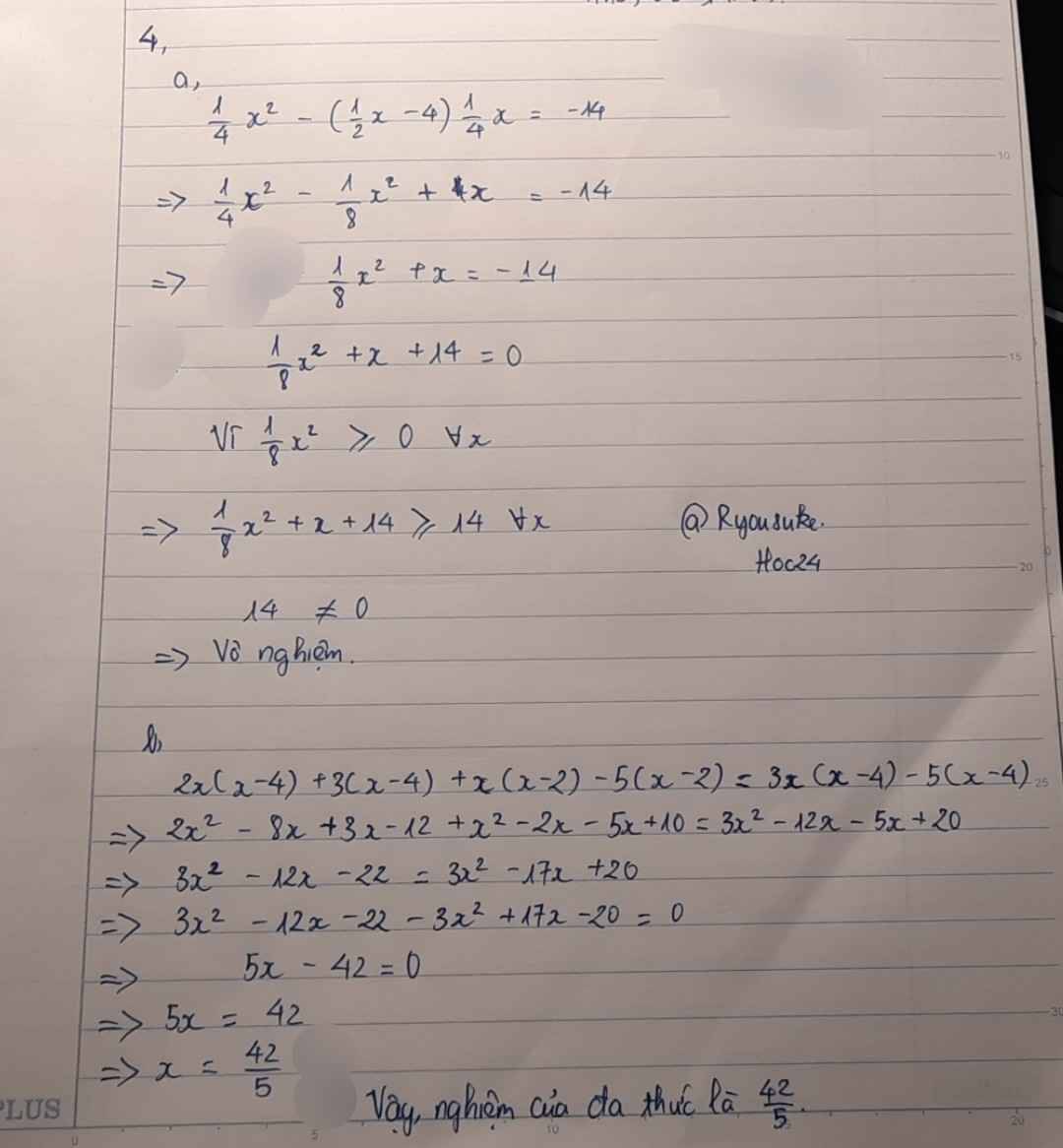
Hãy nhập câu hỏi của bạn vào đây, nếu là tài khoản VIP, bạn sẽ được ưu tiên trả lời.


a, \(-4x+5+2x-1=3\Leftrightarrow-2x=-1\Leftrightarrow x=\dfrac{1}{2}\)
b, \(-2x+2=2\Leftrightarrow x=0\)
c, \(-2x-6=-8\Leftrightarrow x=1\)

Noob ơi, bạn phải đưa vào máy tính ý solve cái là ra x luôn, chỉ tội là đợi hơi lâu
a, 4.(18 - 5x) - 12(3x - 7) = 15(2x - 16) - 6(x + 14)
=> 72 - 20x - 36x + 84 = 30x - 240 - 6x - 84
=> (72 + 84) + (-20x - 36x) = (30x - 6x) + (-240 - 84)
=> 156 - 56x = 24x - 324
=> 24x + 56x = 324 + 156
=> 80x = 480
=> x = 480 : 80 = 6
Vậy x = 6

a: =>5x-2=0 hoặc 2x+1/3=0
=>x=-1/6 hoặc x=2/5
b: Đặt x/2=y/3=k
=>x=2k; y=3k
xy=54
=>6k^2=54
=>k^2=9
=>k=3 hoặc k=-3
TH1: k=3
=>x=6; y=9
TH2: k=-3
=>x=-6; y=-9
c: =>5050x=-213
=>x=-213/5050

Bạn nên viết lại đề bài cho sáng sủa, rõ ràng để người đọc dễ hiểu hơn.
f: =>4(x^2+4x-5)-x^2-7x-10=3(x^2+x-2)
=>4x^2+16x-20-x^2-7x-10-3x^2-3x+6=0
=>6x-24=0
=>x=4
e: =>8x+16-5x^2-10x+4(x^2-x-2)=4-x^2
=>-5x^2-2x+16+4x^2-4x-8=4-x^2
=>-6x+8=4
=>-6x=-4
=>x=2/3
d: =>2x^2+3x^2-3=5x^2+5x
=>5x=-3
=>x=-3/5
b: =>2x^2-8x+3x-12+x^2-7x+10=3x^2-12x-5x+20
=>-12x-2=-17x+20
=>5x=22
=>x=22/5

Bài 1:
a) \(3x^2\left(2x^3-x+5\right)-6x^5-3x^3+10x^2\)
\(=6x^5-3x^3+10x^2-6x^5-3x^3+10x^2\)
\(=10x^2+10x^2\)
\(=20x^2\)
b) \(-2x\left(x^3-3x^2-x+11\right)-2x^4+3x^3+2x^2-22x\)
\(=-2x^4+6x^3+2x^2-22x-2x^4+3x^3+2x^2-22x\)
\(=-4x^4+9x^3+4x^2-44x\)

a) 6x(5x + 3) + 3x(1 – 10x) = 7
⇒ 30x2+18x+3x-30x2=7
⇒21x=7
⇒x=\(\dfrac{7}{21}\)
⇒x= \(\dfrac{1}{3}\)
b) (3x – 3)(5 – 21x) + (7x + 4)(9x – 5) = 44
⇒15x-63x2-15+63x + 63x2-35x+36x-20=44
⇒79x-35=44
⇒79x=44+35
⇒79x=79
⇒x=1

|5\(x\) - 4| = |\(x+2\)|
\(\left[{}\begin{matrix}5x-4=x+2\\5x-4=-x-2\end{matrix}\right.\)
\(\left[{}\begin{matrix}4x=6\\6x=2\end{matrix}\right.\)
\(\left[{}\begin{matrix}x=\dfrac{3}{2}\\x=\dfrac{1}{3}\end{matrix}\right.\)
vậy \(x\in\) { \(\dfrac{1}{3};\dfrac{3}{2}\)}
|2\(x\) - 3| - |3\(x\) + 2| = 0
|2\(x\) - 3| = | 3\(x\) + 2|
\(\left[{}\begin{matrix}2x-3=3x+2\\2x-3=-3x-2\end{matrix}\right.\)
\(\left[{}\begin{matrix}x=-5\\x=\dfrac{1}{5}\end{matrix}\right.\)
vậy \(x\in\){ -5; \(\dfrac{1}{5}\)}



a) ( 5x + 3) - ( x -1 ) = 0
\(\Leftrightarrow\)5x + 3 - x +1 =0
\(\Leftrightarrow\)4x +4 = 0
\(\Leftrightarrow\)4x = -4 \(\Leftrightarrow\)x = \(\frac{-4}{4}\) =-1
b) (3x -2 ) - ( 5x + 4) = ( x - 3) - ( x +5 )
\(\Leftrightarrow\)3x -2 - 5x -4 = x-3 - x -5
\(\Leftrightarrow\)3x - 5x - x + x = -3 -5 +2 +4
\(\Leftrightarrow\)-2x = -2 \(\Leftrightarrow\)x =\(\frac{-2}{-2}\)= 1